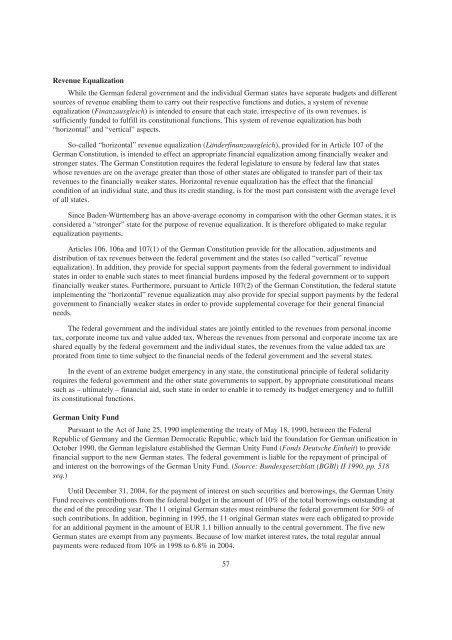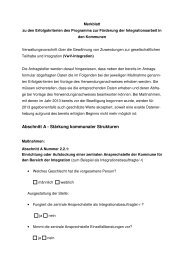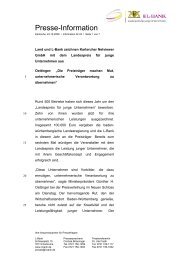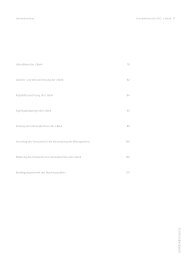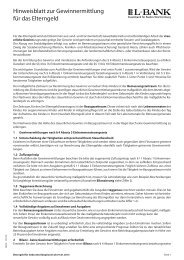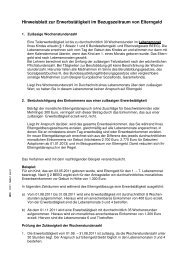Landeskreditbank Baden-Württemberg - L-Bank
Landeskreditbank Baden-Württemberg - L-Bank
Landeskreditbank Baden-Württemberg - L-Bank
You also want an ePaper? Increase the reach of your titles
YUMPU automatically turns print PDFs into web optimized ePapers that Google loves.
Revenue Equalization<br />
While the German federal government and the individual German states have separate budgets and different<br />
sources of revenue enabling them to carry out their respective functions and duties, a system of revenue<br />
equalization (Finanzausgleich) is intended to ensure that each state, irrespective of its own revenues, is<br />
sufficiently funded to fulfill its constitutional functions. This system of revenue equalization has both<br />
“horizontal” and “vertical” aspects.<br />
So-called “horizontal” revenue equalization (Länderfinanzausgleich), provided for in Article 107 of the<br />
German Constitution, is intended to effect an appropriate financial equalization among financially weaker and<br />
stronger states. The German Constitution requires the federal legislature to ensure by federal law that states<br />
whose revenues are on the average greater than those of other states are obligated to transfer part of their tax<br />
revenues to the financially weaker states. Horizontal revenue equalization has the effect that the financial<br />
condition of an individual state, and thus its credit standing, is for the most part consistent with the average level<br />
of all states.<br />
Since <strong>Baden</strong>-Württemberg has an above-average economy in comparison with the other German states, it is<br />
considered a “stronger” state for the purpose of revenue equalization. It is therefore obligated to make regular<br />
equalization payments.<br />
Articles 106, 106a and 107(1) of the German Constitution provide for the allocation, adjustments and<br />
distribution of tax revenues between the federal government and the states (so called “vertical” revenue<br />
equalization). In addition, they provide for special support payments from the federal government to individual<br />
states in order to enable such states to meet financial burdens imposed by the federal government or to support<br />
financially weaker states. Furthermore, pursuant to Article 107(2) of the German Constitution, the federal statute<br />
implementing the “horizontal” revenue equalization may also provide for special support payments by the federal<br />
government to financially weaker states in order to provide supplemental coverage for their general financial<br />
needs.<br />
The federal government and the individual states are jointly entitled to the revenues from personal income<br />
tax, corporate income tax and value added tax. Whereas the revenues from personal and corporate income tax are<br />
shared equally by the federal government and the individual states, the revenues from the value added tax are<br />
prorated from time to time subject to the financial needs of the federal government and the several states.<br />
In the event of an extreme budget emergency in any state, the constitutional principle of federal solidarity<br />
requires the federal government and the other state governments to support, by appropriate constitutional means<br />
such as – ultimately – financial aid, such state in order to enable it to remedy its budget emergency and to fulfill<br />
its constitutional functions.<br />
German Unity Fund<br />
Pursuant to the Act of June 25, 1990 implementing the treaty of May 18, 1990, between the Federal<br />
Republic of Germany and the German Democratic Republic, which laid the foundation for German unification in<br />
October 1990, the German legislature established the German Unity Fund (Fonds Deutsche Einheit) to provide<br />
financial support to the new German states. The federal government is liable for the repayment of principal of<br />
and interest on the borrowings of the German Unity Fund. (Source: Bundesgesetzblatt (BGBl) II 1990, pp. 518<br />
seq.)<br />
Until December 31, 2004, for the payment of interest on such securities and borrowings, the German Unity<br />
Fund receives contributions from the federal budget in the amount of 10% of the total borrowings outstanding at<br />
the end of the preceding year. The 11 original German states must reimburse the federal government for 50% of<br />
such contributions. In addition, beginning in 1995, the 11 original German states were each obligated to provide<br />
for an additional payment in the amount of EUR 1.1 billion annually to the central government. The five new<br />
German states are exempt from any payments. Because of low market interest rates, the total regular annual<br />
payments were reduced from 10% in 1998 to 6.8% in 2004.<br />
57


